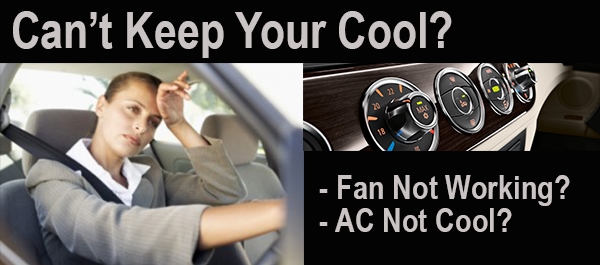Complete AC System Service, Diagnostics, and Repair
Don’t let the heat of Spring / Summer take over the interior of your car.
Most car owners don’t service their air conditioning until after it fails. Maintaining your car or SUV air conditioning system means that you always have enough refrigerant to properly do the job. Small leaks in the air conditioning system allow the refrigerant to escape and the system can’t cool the air as well, or at all.
Along with the refrigerant, a special oil circulates in the system. The oil lubricates air conditioning components, and keeps the seals resilient. Low refrigerant and lubricating oil means that the air conditioning parts will wear out prematurely, and we all know that air conditioning repairs can be costly, especially if it involves the AC compressor.
Air conditioning service by BRracing starts with a visual inspection of the components for signs of damage or leaks. The compressor is normally driven by a belt from the engine, most often the serpentine belt, so it’s inspected for cracks or wear.
The air conditioning compressor and other components are checked for proper operation by your BRR service technician. Then comes the leak test. If a leak is detected, often in a hose or connection, it’s repaired and the system is retested. Your BRR technician will also perform a temperature drop test.
If needed, the old refrigerant is evacuated and the system is recharged with clean, fresh refrigerant (environmentally compliant). A final test insures that the air conditioner is working, and you’re on your way. A good, working HVAC or AC system should produce a temperature drop of about 40F degrees. If the outside temperature is 90F degrees, the air coming out of the vent should be about 50F – 55F degrees.
How often this should be done varies from vehicle to vehicle. Your car or SUV / SAV owner’s manual will have the manufacturer’s recommendation and, of course, your BRR service advisor can tell you. It’s typically between every two years to every four years. Many of our customers though wait till the system fails, and that usually produces a more expensive repair rather than just a service.
The refrigerant in the air conditioner contains a special oil that lubricates and cools the A/C parts. This oil is eventually used up. Your air conditioner still makes cold air, but the parts don’t have oil to protect them and they wear out faster than they should so it’s important to service the air conditioner on a regular basis (meaning, have the AC coolant evacuated and replaced, as the new coolant will have the fresh iii).
Replacing old refrigerant has another benefit: refrigerant tends to gather moisture and become corrosive. That causes leaks in the system which can be expensive to repair. Fresh refrigerant protects the air conditioning components and keeps the system operating at peak efficiency so it doesn’t have to work as hard to keep you cool.
Even with regular service A/C parts can just wear out. Normal wear and tear eventually gets to all moving parts.
Addressing problems early can save on more extensive repairs down the road. For instance, a common failure is the clutch that turns the compressor on and off. If you can take care of a bad A/C clutch when it first starts having problems, you may be able to save the compressor. Wait too long and you’ll have to replace both.
Check your owner’s manual or ask your BRR service advisor for service recommendations. And if you’re hearing strange sounds when your air conditioning turns on, or if it just isn’t as cold as it used to be, have BRR see what it’ll take to keep you cool.
Like most aspects of car maintenance, treating a problem with your vehicle’s air conditioning system early can help prevent major repairs. For example, an air conditioning system operating on low refrigerant due to a leak will eventually damage the compressor. Replacing or repairing the compressor can be more expensive than sealing the leak and refilling the refrigerant. Some symptoms to beware of regarding a faulty air conditioning system include an inoperative fan or blower, an unusual amount of noise during regular operation, and, of course, reduced cooling capability. Stale smelling air is another sign that something is wrong with your vehicle’s air conditioner. A clogged compressor, evaporator, condenser, or expansion valve can contribute to AC system failure. Routine maintenance now can help you avoid major AC repairs down the road.
Don’t wait till its too late. Don’t wait till you take that summer trip thru the Central Valley with daytime temps in the low 100F degrees. Don’t wait till you need to take friends on that road trip…only to have no AC.
Come see BRracing today….we’ll ensure that you are good to go.






Leave A Comment
You must be logged in to post a comment.